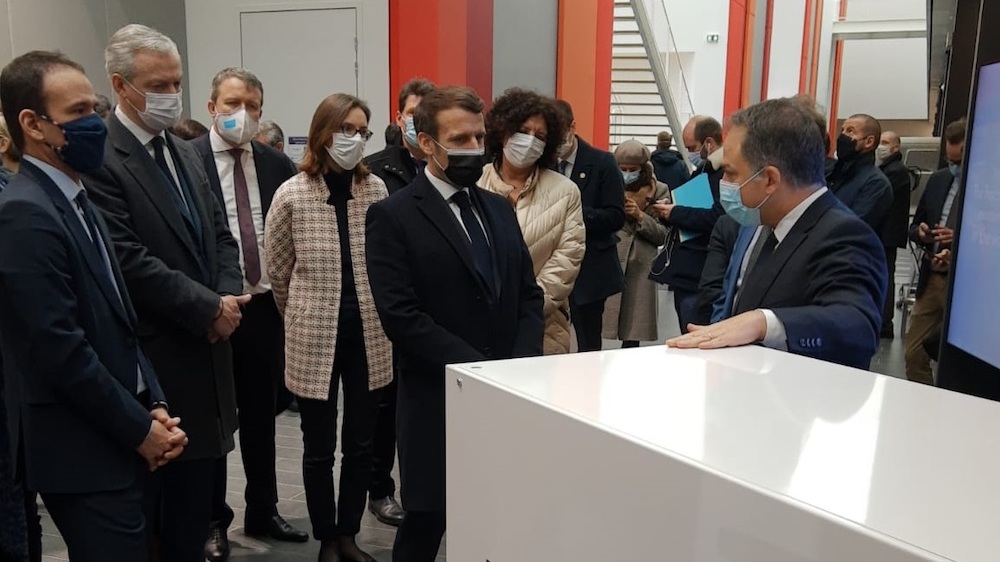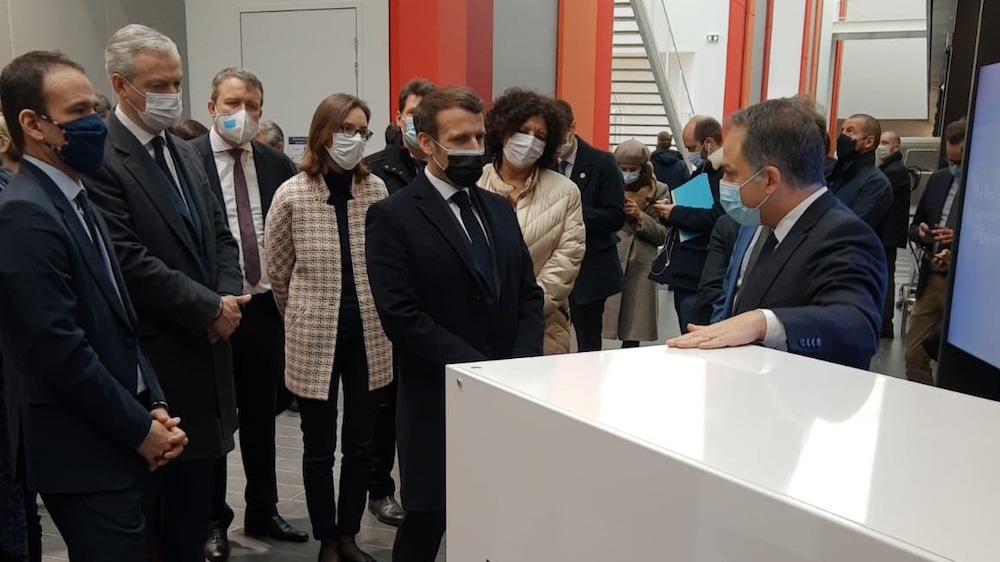
In the foreground, from left to right: Emmanuel Macron and Elie Girard In the back, from left to right: Cédric O, Bruno Le Maire, Amélie de Montchalin andFrédérique Vidal
With unique expertise in Europe and innovative technologies such as the Atos Quantum Learning Machine (Atos QLM), the world's most powerful quantum simulator, Atos is already working closely with national players such as GENCI (Grand Equipement National de Calcul) and the CEA (Commissariat à l'Energie Atomique), as well as the start-up Pasqal. The national quantum strategy now offers Atos the opportunity to accelerate its Atos Quantum program and strengthen its contribution to the French quantum ecosystem, with a view to offering its customers the first benefits of quantum computing in the NISQ (Noisy Intermediate-Scale Quantum) era as soon as possible.
"The plan announced today for the development of quantum technologies is quite remarkable and we are very honored to have been associated with this announcement. Quantum computing promises considerable progress in strategic areas for our society, such as health, chemistry, finance and the fight against global warming and decarbonization. Faced with these major socio-economic challenges, it is essential to set up public-private partnerships and foster cooperation between governments, academic researchers, users and private companies. France's national strategy is equal to the revolution to come and we are proud to be among the players who will participate in making it a reality," said Elie Girard, Atos CEO.
Atos' contribution to the national quantum strategy will focus on four areas:
The development of NISQ simulators and accelerators integrated into hybrid high-performance computing platforms: capitalizing on the Atos QLM and its expertise in high-performance computing, Atos has set the goal of providing a quantum accelerator connected to a supercomputer as early as 2023. On the other hand, innovation in quantum computing is not only about hardware but also about software. This is the direction Atos is taking with the Atos QLM quantum simulation and software development platform.
Post-quantum cryptography: Atos is already working on integrating post-quantum algorithms into its cybersecurity equipment. Its work in this area will further accelerate the developments needed to prepare the hardware implementations of future post-quantum standards.
International cooperation: Atos has made working in cooperation with future industrial users a priority of its Atos Quantum program. The Group is involved in several academic projects, notably with the Institut d'Optique and INRIA. In parallel, its expertise and the Atos QLM contribute to several European programs, including the NEASQC (NExt ApplicationS of Quantum Computing) project. As part of the national quantum strategy, Atos intends to leverage the experience gained through these various projects to foster interactions between academics, technology providers and users.
Benchmarking: the rapid and continuous emergence of new technologies and approaches to quantum programming is essential for the development of the sector, but also a source of complexity for organizations wishing to invest. In 2020, Atos developed Q-score, the first reliable, objective and fair universal metric to simplify the relationship between technology users and providers.
Atos established a Scientific Council dedicated to Quantum. Members are:
Alain Aspect, Professor at the Institut d'Optique Graduate School and Ecole Polytechnique, Université Paris-Saclay;
David DiVincenzo, Professor at the Alexander von Humboldt University and Director at the Institute for Theoretical Nanoelectronics at the Juelich Research Center;
Artur Ekert, Professor of Quantum Physics at the Mathematical Institute at the University of Oxford and Founding Director of the Centre for Quantum Technologies (CQT) at the National University of Singapore;
Daniel Esteve, Research Director, CEA Saclay, Head of Quantronics;
Serge Haroche, Professor Emeritus at the Collège de France, Nobel Prize in Physics.
"The plan announced today for the development of quantum technologies is quite remarkable and we are very honored to have been associated with this announcement. Quantum computing promises considerable progress in strategic areas for our society, such as health, chemistry, finance and the fight against global warming and decarbonization. Faced with these major socio-economic challenges, it is essential to set up public-private partnerships and foster cooperation between governments, academic researchers, users and private companies. France's national strategy is equal to the revolution to come and we are proud to be among the players who will participate in making it a reality," said Elie Girard, Atos CEO.
Atos' contribution to the national quantum strategy will focus on four areas:
The development of NISQ simulators and accelerators integrated into hybrid high-performance computing platforms: capitalizing on the Atos QLM and its expertise in high-performance computing, Atos has set the goal of providing a quantum accelerator connected to a supercomputer as early as 2023. On the other hand, innovation in quantum computing is not only about hardware but also about software. This is the direction Atos is taking with the Atos QLM quantum simulation and software development platform.
Post-quantum cryptography: Atos is already working on integrating post-quantum algorithms into its cybersecurity equipment. Its work in this area will further accelerate the developments needed to prepare the hardware implementations of future post-quantum standards.
International cooperation: Atos has made working in cooperation with future industrial users a priority of its Atos Quantum program. The Group is involved in several academic projects, notably with the Institut d'Optique and INRIA. In parallel, its expertise and the Atos QLM contribute to several European programs, including the NEASQC (NExt ApplicationS of Quantum Computing) project. As part of the national quantum strategy, Atos intends to leverage the experience gained through these various projects to foster interactions between academics, technology providers and users.
Benchmarking: the rapid and continuous emergence of new technologies and approaches to quantum programming is essential for the development of the sector, but also a source of complexity for organizations wishing to invest. In 2020, Atos developed Q-score, the first reliable, objective and fair universal metric to simplify the relationship between technology users and providers.
Atos established a Scientific Council dedicated to Quantum. Members are:
Alain Aspect, Professor at the Institut d'Optique Graduate School and Ecole Polytechnique, Université Paris-Saclay;
David DiVincenzo, Professor at the Alexander von Humboldt University and Director at the Institute for Theoretical Nanoelectronics at the Juelich Research Center;
Artur Ekert, Professor of Quantum Physics at the Mathematical Institute at the University of Oxford and Founding Director of the Centre for Quantum Technologies (CQT) at the National University of Singapore;
Daniel Esteve, Research Director, CEA Saclay, Head of Quantronics;
Serge Haroche, Professor Emeritus at the Collège de France, Nobel Prize in Physics.




 IonQ Achieves Industry Leading Performance on Next Generation Barium Qubits
IonQ Achieves Industry Leading Performance on Next Generation Barium Qubits